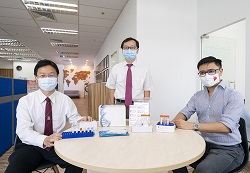
23 October 2020 - After 8 years of discovery research, product development and clinical validation involving 5,248 subjects from Singapore and South Korea, NUHS has developed a non-invasive blood-based test targeting gastric cancer, more accurate than any of the existing conventional blood-based biomarker tests for detecting the cancer. This is a major event in the advancement of gastric cancer care, with the feasibility of rolling out the test in primary care in the near future.
The performance of the test was validated with endoscopies and biopsies andvwas shown to detect gastric cancer with high sensitivity across age groups, genders, ethnicities and tumour stages. The test is able to detect 87% of all gastric cancers, including 87.5% of patients with stage I cancers. The findings were published in Gut, a leading medical journal, in October 2020.
The extensive research project which started in 2012 involved an incredible team of clinicians and scientist from NUHS institutions and partner research agencies. It was by led by Professor Jimmy So, Head and Senior Consultant, Division of General Surgery (Upper Gastrointestinal Surgery), NUH, and Head and Senior Consultant, Division of Surgical Oncology, NCIS; Professor Yeoh Khay Guan, Senior Consultant, Division of Gastroenterology and Hepatology, NUH; and Associate Professor Too Heng-Phon, Department of Biochemistry, NUS Yong Loo Lin School of Medicine.
Potential tool for primary care
The team is planning to evaluate the feasibility of utilising this test in the primary care setting to identify people who are at risk of contracting gastric cancer. The cost of the test is estimate to be less than $200 at public hospitals. "The majority of gastric cancer patients are diagnosed at advanced stages, for which the five-year survival rate is lower than 5%. Early detection is thus the key to reducing death from gastric cancer. To bring about a meaningful fall in the mortality rate, an effective strategy that would detect gastric cancer early so as to enable prompt intervention is required. This non-invasive blood test is a breakthrough in gastric cancer diagnosis and it may potentially be used as an effective screening test for the early diagnosis of gastric cancer," said Professor So.
The test takes about 3 hours to run in a clinical lab and the report could be delivered to the patient’s doctor within a week. It thus presents an alternative solution to endoscopy (considered invasive and expensive) for initial investigations. Explained Associate Professor Too, "The test does not replace endoscopic evaluation. We believe this test provides an option for patients who might not be keen on initial endoscopic screening and adds to the current cancer detection tool armamentarium, just as the stool DNA test is an option for colon cancer screening. Furthermore, the convenience and non-invasiveness of this test allows the public to have access to better healthcare."
Further research on improving the usability of the test kit is underway. The research was supported by MOH’s National Medical Research Council under its Bedside & Bench Grant, the Translational and Clinical Research Grant, and the Technology Development Grants from A*STAR; and supported by the Singapore Gastric Cancer Consortium.
Related:
















